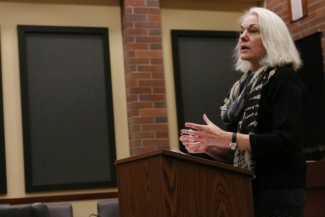Pulitzer Prize-winning journalist headlines fourth annual Oppenheimer
Pulitzer Prize-winning journalist Jacqui Banaszynski said journalists can’t be afraid to embrace their own human instincts if they want to capture true humanity on paper.
“I have come to believe in the imperative and purpose of discovering, honoring and sharing the human story,” Banaszynski said.

Caden Fields-Brown | Argonaut
Jacqui Banaszynski, Pulitzer Prize-winning writer, speaks about the ethics of storytelling Thursday in the Law courtroom.
Banaszynski was this year’s keynote speaker at the University of Idaho’s annual Oppenheimer Ethics Symposium. Her speech, “Daring to Care: A Journalist’s True Ethic,” covered how to write about an emotionally intense topic.
She talked about her Pulitzer-winning series, “AIDS in the Heartland,” which detailed the lives of a gay farm couple who were both dying of AIDS.
She detailed a scene in a hospital hallway. One of the men her stories followed, Burt, was on his death bed eight months after his partner, Dick, had already died from AIDS.
Burt’s family held a vote on whether or not they should keep him on life support, and Burt’s mother requested Banaszynski have a say in the vote as well, as she had become quite close to Burt and Dick during the course of her series. She used her own ethical dilemma to explain why good journalists should care about the stories they write without allowing their emotions to lead them toward advocacy.
“The presumption is that we must put down our personal values, perhaps even our humanity when we pick up our notebooks or our cameras,” she said. “What a misperception and what a shame, because the best journalism is driven by passion.”
Banaszynski took the time to pinpoint three qualities journalists should have while covering their stories — craft, courage and compassion.
She said the best journalists become masters by applying their craft, but admitted the work doesn’t become easier over time – it just becomes easier to understand. She said taking into account the world’s various social media networks, it is important for journalists to reach through the fray instead of rising above it.
During the Q-and-A period, Director of the School of Journalism and Mass Media Kenton Bird asked Banaszynski to elaborate on journalism in the social media age. Banaszynski said even though “viral” stories on the Internet are about people, sometimes they spur low quality journalism.
“I think the journalist still has to have a role in doing those stories at a much higher level,” she said. “So the stories that do get passed around and talked about are true and have purpose.”

Caden Fields-Brown | Argonaut
Pulitzer Prize winner Jacqui Banaszynski addresses story telling in front of a crowd Thursday in the law courtroom.
Banaszynski also said journalists need to have compassion for their subjects. She said if the writer of a story doesn’t care about their topic, why should anyone else care?
“For AIDS in the Heartland,” Banaszynski said while her job was made challenging because she had grown to care for Burt and Dick, she didn’t compromise her ethical beliefs by taking a vote in Burt’s fate. Instead, she gave his family all of the information Burt had given her about his state of being to help them reach their own decision.
Banaszynski used examples of her experiences while writing for “AIDS in the Heartland,” to illustrate another point she made about the need for journalists to be courageous in their coverage. She said journalists must have courage to go where their stories take them.
While writing Burt and Dick’s story, Banaszynski was witness to multiple intimate events, including their moments of death. She said while she had grown to care for both of them, she needed to have enough courage to look deep for information people needed to know.
She said in her coverage she asked the two men personal questions, such as who initially contracted the HIV virus. Additionally, her newspaper ran intense photos, including ones from Dick’s last day in the hospital.
Banaszynski said it is important to publish sensitive information like Dick and Burt’s story because humanity is at the heart of all good stories.
“It’s what people wonder,” she said. “It’s our humanity, so have the courage to ask the question and face that humanity, and then have the compassion to really care about the answer.”
Erin Bamer can be reached at [email protected]
